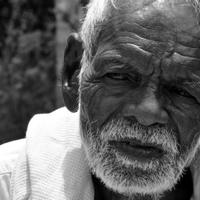Currently there are more than 30 million orphans estimated in India. Only about 2,500 were adopted last year, down from 5,700 four years ago (http://www.unicef.org/publications/files/SOWC_2015_Summary_and_Tables.pdf). The adoption market is quite poor and, in fact, nobody knows exactly how many orphans, or how many adopted children are in India because many of them are not registered.
One of the orphan girls, 10 years old
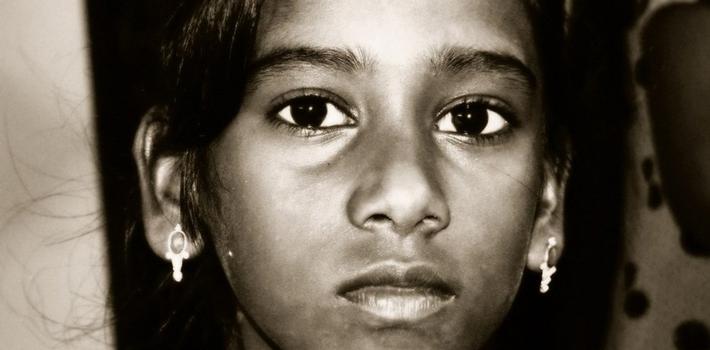
The elderly population crossed the 100-million mark last year, and 51 million out of this number live below poverty line. According to the national survey less than 11 percent of them have a pension of any sort (http://www.helpageindia.org/pdf/annualreport201213.pdf).
I came to the village near Chennai (the capital city of the Indian state of Tamil Nadu, South India), where there is an orphanage called “Hope for future” http://www.hopeforfuture.org.in/index.php (which is the name of every second orphanage) and also some older people living there alone without any family members. What I was trying to do there is to create intergenerational interaction between those orphans and older people living in the village and see how it correlates with their subjective well-being. But, firstly let me tell you about their living conditions. This orphanage provides care to 15-20 children aged 0-18. Every child in this orphanage has at least one parent. Usually they get to the orphanage because of gender, abuse or neglect, parents’ alcohol or drug addiction, abandonment and poverty. All the children go to school, or preschool (there are no infants or toddlers at the moment). After they turn 18 the orphanage supports them with a higher education. The orphanage also provides health treatment in case of need. Although they sleep on a floor and have no shower, this is a very good example of an orphanage. This orphanage is supported mainly by private donations from one German family. Currently there are 25 children: 11 with one surviving parent, 4 with disabled parents, 1 HIV+ (semi-orphan), and 9 abandoned after parents’ divorce or because of poverty.
There are about 30 older adults in the village. Mostly they live in dwellings lacking access to an improved sewer system. They don’t really know their exact age, so the answers were: “about 50”, “about 60”. The oldest one was a man aged 80 (he was the only older man there as well).
An old lady in the village. Totally blind. ‘About 60’
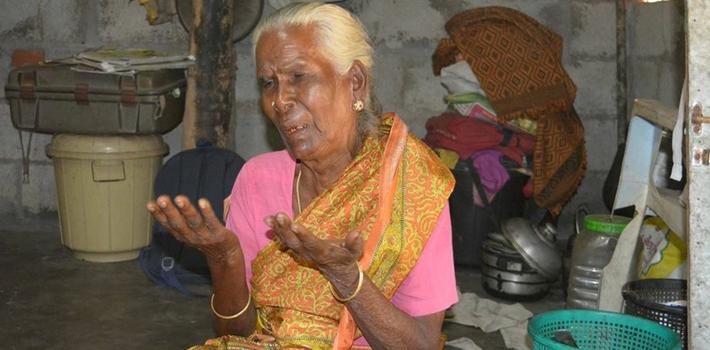
They live alone supported by help of the village community. Most of them have vision problems and cardiovascular disease. The leading cause of diminished vision is cataract. They believe that the diminution of vision is the consequence of ageing. There is enough research evidence that depression, particularly mild depression, is common in this rural population of older adults, particularly among women and widowed elderly (http://www.helpageindia.org/pdf/annualreport201213.pdf). I cannot be scientifically certain that I was observing depression in this case but it was my strong impression.
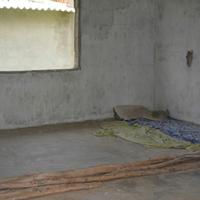

I was conducting interviews asking questions about their death attitudes, their wishes, regrets, and fears and of course I was asking them about their living conditions. The answers were quite similar: everybody was unhappy, everybody was quite negative about their children who were not taking care of them, they all had serious health issues and this took a big part of the interviews; many were saying that they want to die and didn’t demonstrate belief in the afterlife.
The only one older man in the village. ‘About 80’
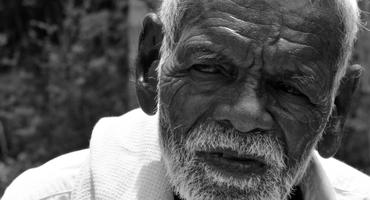

About the Author:
Daria Belostotskaya is a James Martin Visiting Fellow at the Oxford Institute of Population Ageing and a PhD candidate in Vienna University, the faculty of psychology.
Opinions of the blogger is their own and not endorsed by the Institute
Comments Welcome: We welcome your comments on this or any of the Institute's blog posts. Please feel free to email comments to be posted on your behalf to administrator@ageing.ox.ac.uk or use the Disqus facility linked below.


